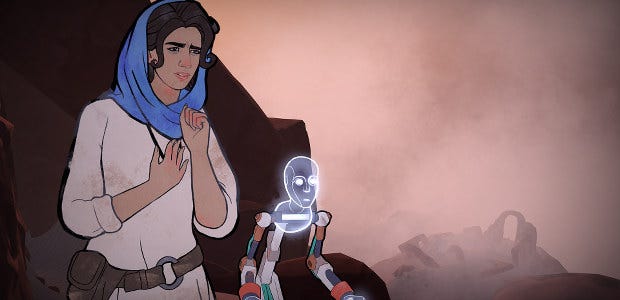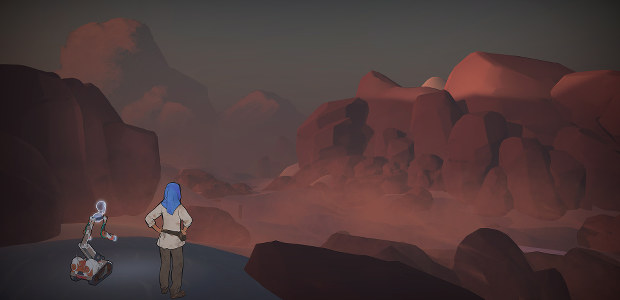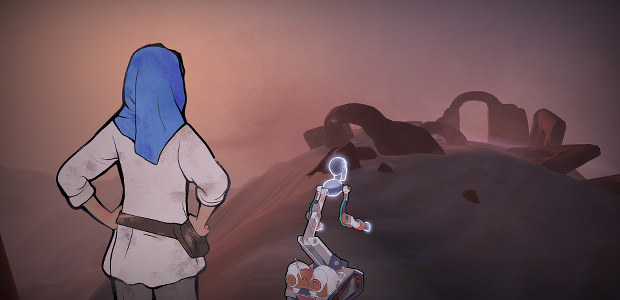Inkle's Heaven's Vault: a stunning sci-fi archaeology adventure
Set phasers to translate
With 80 Days and Sorcery, Inkle have made some of our favourite games of recent years, but Heaven's Vault [official site] might just be their greatest achievement yet. It's early days, of course, but a half hour play session at GDC has already convinced me that this science fiction adventure is a very exciting thing indeed. It's a game about exploring the past, in the future, through archaeology and translation, and it has a remarkable sense of wonder.
When people say something looks better in motion, they're often also saying, “wow, that doesn't look all that great in stills, does it? Please don't judge the stills.” With Heaven's Vault, I found the stills so attractive that I was dreading getting a closer look and seeing the art lose its appeal when glued onto a game.
But, no, Heaven's Vault looks better in motion. Those painted figures shimmer across the landscape, using just a few frames as they transition from one place to the next, fading in and out of view as they move. It's an elegant solution, allowing the quality of the artwork to survive animation, while also condensing some of the long treks from place to place into a smaller timeframe than they'd need if every step were modeled. Heaven's Vault isn't a walking simulator, but the ambulating industry could learn a lot from its methods.
It's not an interactive fiction game either, though Inkle haven't entirely pulled up their roots. That said, Inkle's games have never been traditional interactive fiction, despite their wordiness. The later releases in the Sorcery series moved away from their game book origins, introducing complex systems and rules. Even 80 Days, which feels like the purest of narrative adventures, has resource management and makes strong use of art alongside its text.
Heaven's Vault moves all of those aspects forward. It's still a game built around words, perhaps more so than anything else in the Inkle catalogue, but it plays like a graphic novel. The build that I played has just one location, an apparently lifeless desert planet, but there are many places to go. By the time I reached the demo's cut-off point, having climbed to the point of exhaustion in thin air, I felt like an explorer, stepping into the unknown at every turn.
Lead character Aliya Elasra is an explorer of a sort. She's an archaeologist, working out of a university, exploring the Nebula, a network or rivers flowing between moons. The old meets the new in this sailing through space, and in Aliya's explorations, which involve dusting down surfaces to read ancient inscriptions as well as asking a trundling robot companion for advice. That robot, Six, fits into the mould of the impatient, ultra-logical companion, used for laughs as well as assistance. The dialogue between the pair is well-written, Aliya driven by intellectual curiosity and a hint of something more personal, while Six is a reluctant and sometimes cruel source of advice.
Movement is between nodes, though a less restrictive mode is also planned. You're free to look around though, while standing at a node, and in doing so can highlight items or areas of interest. Clicking – or pushing a button – moves Aliya to the target area or object, and there may then be other options, to investigate, ask Six for input, or observe from a distance. Those are just examples of the basics. During my brief time with the game I also dropped a stone down a well and crept into an abandoned (?) building.
And all along the way, I was solving puzzles. Or failing to solve them. More on that in a second; first, a reassurance that these aren't block-switching puzzles or Towers of Hanoir or crosswords or Sudoku. Puzzles it the wrong word entirely really, so let's scrap it. You're not solving puzzles, you're translating an alien language.
Oh, but of course, that'll involve doing a Word Search or a Jumble or playing Scrabble or doing Word Tetris, won't it? No it absolutely will not. You translate by paying attention to the context of inscriptions, combining that with knowledge of the language's symbols that you've already built up, and then make educated guesses. If you're anything like me, some of those guesses will be terrible. Fortunately, you probably won't have the game's writers watching you make those terrible guesses.
The very first choice in the game is between “Temple” and “Port”. Words in this language are often compound, a few symbols crunched together to create new meaning. That makes it easier to figure out what individual symbols in a cluster might mean if you're sure of the definition of at least one of them. The interface handily marks out possible translations of those symbols and definite meanings, based on your previous work.
In this instance, I knew nothing. The symbols in question are written on a stone that is either a marker, pointing the way, or part of an actual ruin. It's partly submerged in the planet's red sand. Given all that sand, stretching from one horizon to the next, and the arid rocks that littered the surface, I figured this was definitely a port. In the middle of a desert, on a planet that might never have been home to even the tiniest drop of water.
No matter. As I tried to explain, realising I'd made a blunder when Six snarked in the background, I'd thought that the place might have been a port for the moonriver ships. I don't know how any of this works and even though the demo segment had clearly been selected as a gentle introduction, the lack of context as to how the Nebula works, as a social and geographical place as well as its history, had left me floundering a little.
Thankfully, Heaven's Vault doesn't lock doors or paths if you muddle through the translations. Brilliantly, the words you choose will become part of the conversation between Six and Aliya, so I might see a reference to “the port back there”, or, later, “home from water”. As soon as you read something like that last phrase, you can be sure you've made a mistake somewhere. Inkle have decided that the syntax and word order of the translated language should fit with English norms (I wonder how this game about translation will work in translation?), so if it looks like nonsense it probably is. The one exception to this is articles (the/a/an), which have been consigned to the scrapheap.
I find it hard to imagine how the game as a whole will work, having only experienced one aspect of it with this slice of planetary exploration, but I love that it's possible to carry a false assumption around, for a while at least. It feels true to the process of understanding history – if we mistake an action figure for an idol to be worshiped, our understanding of an entire society might be altered. Here, incorrect translations won't prevent progress and you won't be able to build too far on a false foundation; instead, you'll be able to consider your mistakes and the corrections to those mistakes.
Though there is a definite sense of progress, and even a stamina meter of a sort to measure strenuous activity, Heaven's Vault isn't a game about Jonesing through some ruins and Crofting explosive solutions to the obstacles in your way. It's a game about building up a picture of history, of societies that no longer exist, and figuring out what they can tell us about ourselves. While I'm not expecting a story as personal as Arrival's sci-fi translation gave us, I'd be surprised if we don't learn about Aliya as she learns about the Nebula and its previous inhabitants. We're also going to learn more about those moon rivers and how robots like Six work, and how they came to be, and maybe where the gods have gone, or how they left the world.
In short, Inkle are doing Big Picture sci-fi here. Translation, exploration and conversation will be the heart of the game, and having had a brief taste of all three, I'm as delighted as I hoped to be. Inkle haven't put a foot wrong so far and Heaven's Vault looks like such an intelligent expansion of the core ideas that have run through their previous work that it feels like both a natural progression and a bold step forward.
We're so accustomed to science fiction games that are about conquest or survival that the sense of mystery and discovery can seem like a secondary aspect of the genre. Heaven's Vault looks less Lucasarts and more Le Guin, and spending half an hour in its company has me anticipating the full version more than almost any other game. I might not understand everything it's trying to tell me, but as learning processes go, it's a hell of an exciting one.


